英语中省略现象
- 格式:doc
- 大小:86.50 KB
- 文档页数:12
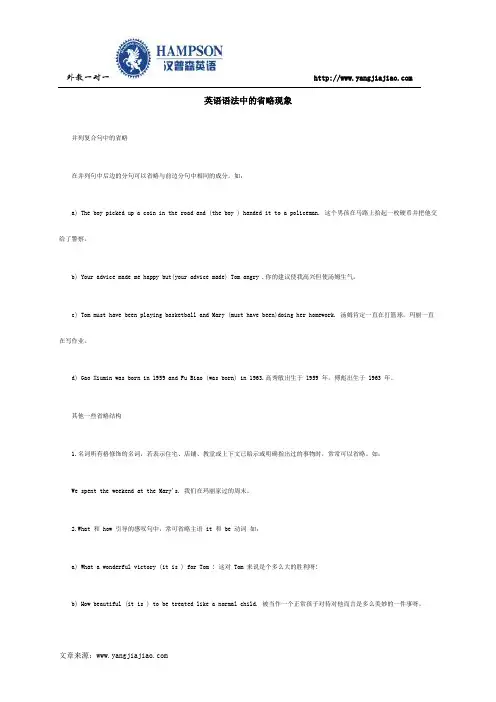
外教一对一英语语法中的省略现象并列复合句中的省略在并列句中后边的分句可以省略与前边分句中相同的成分。
如:a) The boy picked up a coin in the road and (the boy ) handed it to a policeman. 这个男孩在马路上拾起一枚硬币并把他交给了警察。
b) Your advice made me happy but(your advice made) Tom angry .你的建议使我高兴但使汤姆生气。
c) Tom must have been playing basketball and Mary (must have been)doing her homework. 汤姆肯定一直在打篮球,玛丽一直在写作业。
d) Gao Xiumin was born in 1959 and Fu Biao (was born) in 1963.高秀敏出生于 1959 年,傅彪出生于 1963 年。
其他一些省略结构1.名词所有格修饰的名词,若表示住宅、店铺、教堂或上下文已暗示或明确指出过的事物时,常常可以省略。
如:We spent the weekend at the Mary's. 我们在玛丽家过的周末。
2.What 和 how 引导的感叹句中,常可省略主语 it 和 be 动词如:a) What a wonderful victory (it is ) for Tom ! 这对 Tom 来说是个多么大的胜利呀!b) How beautiful (it is ) to be treated like a normal child. 被当作一个正常孩子对待对他而言是多么美妙的一件事呀。
外教一对一。

高考英语中从句的省略现象[725400]陕西省岚皋中学孙忠平英语中的绝大多数状语从句,如:时间、地点、原因、条件、方式、比较、让步等从句,当其主语与主句的主语一致或者主语为it,且从句谓语部分含有动词be(助动词或系动词)时,通常可以将主语和动词be省略,有时甚至还可以省去从句的引导词,仅只剩下名词、形容词、副词、介词短语、不定式、分词(短语)等,使从句结构大大简化,达到简洁明了的视、听效果。
请看以下各例,注意从句中的省略及余下部分:1.The first country singers sang while(they were)playing the guitar.(时间状语从句)2.Fill in the blanks with articles where (it is )necessary .(地点状语从句)3.As/Because(it has been)written carelessly,your composition is full of mistakes.(原因状语从句)4.She won’t come to our party unless (she is )invited .(条件状语从句)5.He opened his lips as if(he were)to speak.(方式状语从句)6.Her ringing voice is as sharp as (it is )before .(比较状语从句)7.Whether(she is )well or sick,she always keeps calm.(让步状语从句)同样地,在以关系代词that,which,who引导的定语从句中,关系代词做从句的主语,谓语部分含有动词be时,也可以采取上述相似的省略方式来精简句子结构。
这时,从句中的余下部分大都是一些分词短语,其中现在分词与先行词之间是主动关系,具有进行或持续的意义;过去分词与先行词构成被动关系,表示被动、完成的意思。
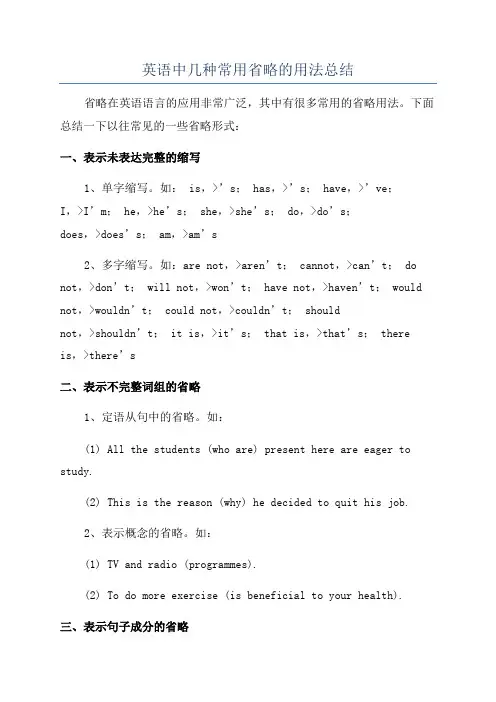
英语中几种常用省略的用法总结省略在英语语言的应用非常广泛,其中有很多常用的省略用法。
下面总结一下以往常见的一些省略形式:一、表示未表达完整的缩写1、单字缩写。
如: is,>’s; has,>’s; have,>’ve;I,>I’m; he,>he’s; she,>she’s; do,>do’s;does,>does’s; am,>am’s2、多字缩写。
如:are not,>aren’t; cannot,>can’t; do not,>don’t; will not,>won’t; have not,>haven’t; would not,>wouldn’t; could not,>couldn’t; shouldnot,>shouldn’t; it is,>it’s; that is,>that’s; there is,>there’s二、表示不完整词组的省略1、定语从句中的省略。
如:(1) All the students (who are) present here are eager to study.(2) This is the reason (why) he decided to quit his job.2、表示概念的省略。
如:(1) TV and radio (programmes).(2) To do more exercise (is beneficial to your health).三、表示句子成分的省略1、宾语的省略。
如:(1) I like to read (books).(2) He gave me an answer (to my question).2、表语的省略。
如:(1) He is a teacher (of English).(2) The weather today is (very) hot.3、主语的省略。
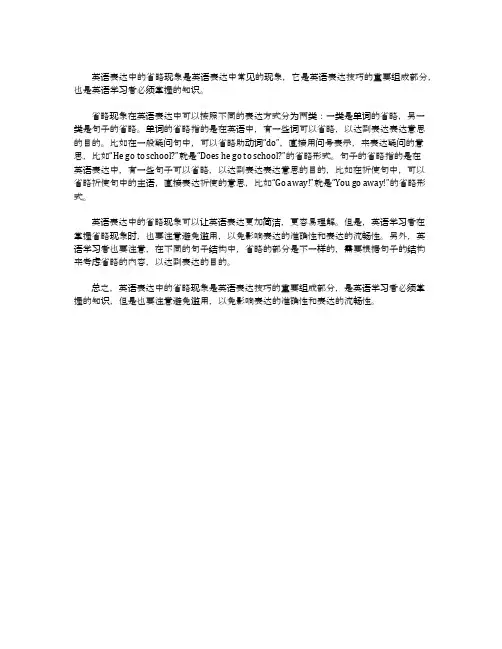
英语表达中的省略现象是英语表达中常见的现象,它是英语表达技巧的重要组成部分,也是英语学习者必须掌握的知识。
省略现象在英语表达中可以按照不同的表达方式分为两类:一类是单词的省略,另一类是句子的省略。
单词的省略指的是在英语中,有一些词可以省略,以达到表达表达意思的目的。
比如在一般疑问句中,可以省略助动词“do”,直接用问号表示,来表达疑问的意思,比如“He go to school?”就是“Does he go to school?”的省略形式。
句子的省略指的是在
英语表达中,有一些句子可以省略,以达到表达表达意思的目的,比如在祈使句中,可以
省略祈使句中的主语,直接表达祈使的意思,比如“Go away!”就是“You go away!”的省略形式。
英语表达中的省略现象可以让英语表达更加简洁,更容易理解。
但是,英语学习者在
掌握省略现象时,也要注意避免滥用,以免影响表达的准确性和表达的流畅性。
另外,英语学习者也要注意,在不同的句子结构中,省略的部分是不一样的,需要根据句子的结构来考虑省略的内容,以达到表达的目的。
总之,英语表达中的省略现象是英语表达技巧的重要组成部分,是英语学习者必须掌
握的知识,但是也要注意避免滥用,以免影响表达的准确性和表达的流畅性。
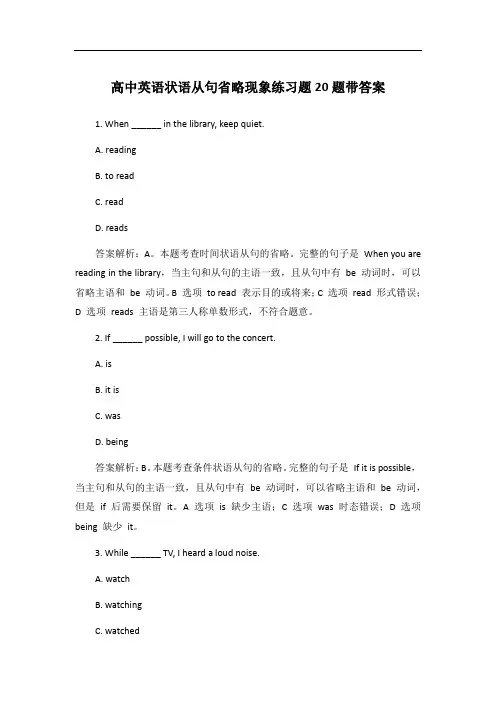
高中英语状语从句省略现象练习题20题带答案1. When ______ in the library, keep quiet.A. readingB. to readC. readD. reads答案解析:A。
本题考查时间状语从句的省略。
完整的句子是When you are reading in the library,当主句和从句的主语一致,且从句中有be 动词时,可以省略主语和be 动词。
B 选项to read 表示目的或将来;C 选项read 形式错误;D 选项reads 主语是第三人称单数形式,不符合题意。
2. If ______ possible, I will go to the concert.A. isB. it isC. wasD. being答案解析:B。
本题考查条件状语从句的省略。
完整的句子是If it is possible,当主句和从句的主语一致,且从句中有be 动词时,可以省略主语和be 动词,但是if 后需要保留it。
A 选项is 缺少主语;C 选项was 时态错误;D 选项being 缺少it。
3. While ______ TV, I heard a loud noise.A. watchB. watchingC. watched答案解析:B。
本题考查时间状语从句的省略。
完整的句子是While I was watching TV,当主句和从句的主语一致,且从句中有be 动词时,可以省略主语和be 动词。
A 选项watch 形式错误;C 选项watched 表示被动;D 选项to watch 表示目的或将来。
4. If ______ hard, you will pass the exam.A. studyB. studyingC. studiedD. to study答案解析:B。
本题考查条件状语从句的省略。
完整的句子是If you are studying hard,当主句和从句的主语一致,且从句中有be 动词时,可以省略主语和be 动词。
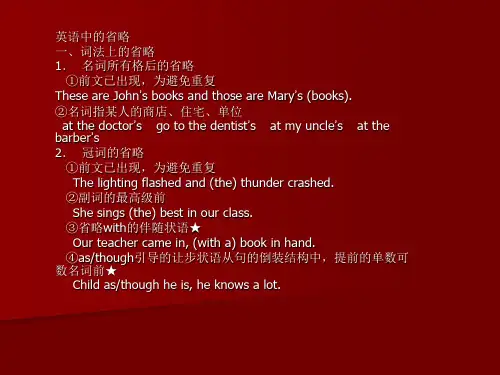
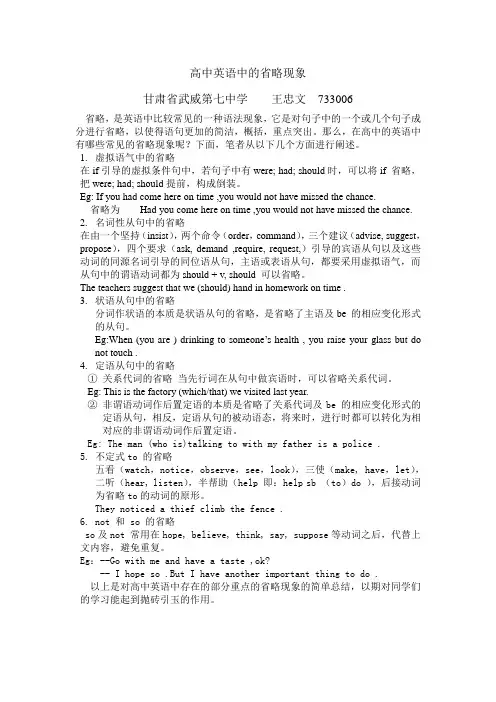
高中英语中的省略现象甘肃省武威第七中学王忠文733006省略,是英语中比较常见的一种语法现象,它是对句子中的一个或几个句子成分进行省略,以使得语句更加的简洁,概括,重点突出。
那么,在高中的英语中有哪些常见的省略现象呢?下面,笔者从以下几个方面进行阐述。
1.虚拟语气中的省略在if引导的虚拟条件句中,若句子中有were; had; should时,可以将if 省略,把were; had; should提前,构成倒装。
Eg: If you had come here on time ,you would not have missed the chance.省略为Had you come here on time ,you would not have missed the chance. 2.名词性从句中的省略在由一个坚持(insist),两个命令(order,command),三个建议(advise, suggest,propose),四个要求(ask, demand ,require, request,)引导的宾语从句以及这些动词的同源名词引导的同位语从句,主语或表语从句,都要采用虚拟语气,而从句中的谓语动词都为should + v, should 可以省略。
The teachers suggest that we (should) hand in homework on time .3.状语从句中的省略分词作状语的本质是状语从句的省略,是省略了主语及be 的相应变化形式的从句。
Eg:When (you are ) drinking to someone’s health , you raise your glass but do not touch .4.定语从句中的省略①关系代词的省略当先行词在从句中做宾语时,可以省略关系代词。
Eg: This is the factory (which/that) we visited last year.②非谓语动词作后置定语的本质是省略了关系代词及be 的相应变化形式的定语从句,相反,定语从句的被动语态,将来时,进行时都可以转化为相对应的非谓语动词作后置定语。
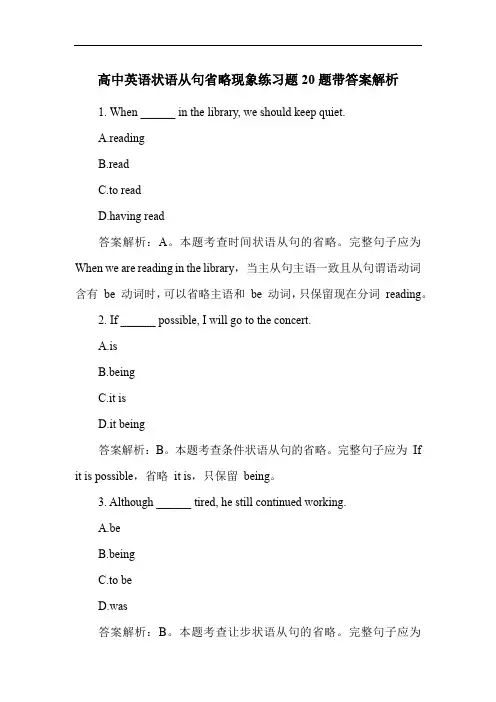
高中英语状语从句省略现象练习题20题带答案解析1. When ______ in the library, we should keep quiet.A.readingB.readC.to readD.having read答案解析:A。
本题考查时间状语从句的省略。
完整句子应为When we are reading in the library,当主从句主语一致且从句谓语动词含有be 动词时,可以省略主语和be 动词,只保留现在分词reading。
2. If ______ possible, I will go to the concert.A.isB.beingC.it isD.it being答案解析:B。
本题考查条件状语从句的省略。
完整句子应为If it is possible,省略it is,只保留being。
3. Although ______ tired, he still continued working.A.beB.beingC.to beD.was答案解析:B。
本题考查让步状语从句的省略。
完整句子应为Although he is tired,省略he is,只保留being。
4. When ______ to answer the question, he remained silent.A.askedB.askingC.to askD.having asked答案解析:A。
时间状语从句省略,完整句子为When he was asked to answer the question,省略he was,只保留asked。
5. If ______ carefully, the experiment will succeed.A.doB.doneC.doingD.to do答案解析:B。
条件状语从句省略,完整句子为If it is done carefully,省略it is,只保留done。
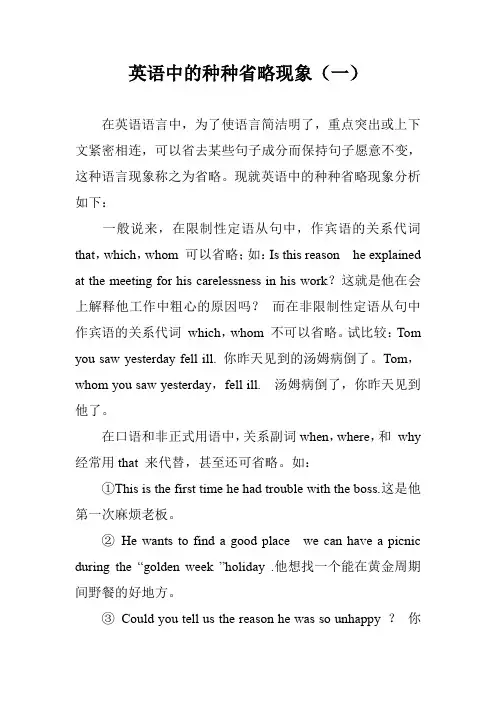
英语中的种种省略现象(一) 在英语语言中,为了使语言简洁明了,重点突出或上下文紧密相连,可以省去某些句子成分而保持句子愿意不变,这种语言现象称之为省略。现就英语中的种种省略现象分析如下: 一般说来,在限制性定语从句中,作宾语的关系代词 that,which,whom 可以省略;如:Is this reason he explained at the meeting for his carelessness in his work?这就是他在会上解释他工作中粗心的原因吗? 而在非限制性定语从句中作宾语的关系代词 which,whom 不可以省略。试比较:Tom you saw yesterday fell ill. 你昨天见到的汤姆病倒了。Tom,whom you saw yesterday,fell ill. 汤姆病倒了,你昨天见到他了。 在口语和非正式用语中,关系副词when,where,和 why 经常用that 来代替,甚至还可省略。如: ①This is the first time he had trouble with the boss.这是他第一次麻烦老板。 ② He wants to find a good place we can have a picnic during the “golden week ”holiday .他想找一个能在黄金周期间野餐的好地方。 ③ Could you tell us the reason he was so unhappy ? 你能告诉我们他为什么如此不高兴吗? 当先行词为表示方式的 the way 时,从句不能用 how 来引导,应该用that 或 in which,或将它们全部省略。如: I don’t like the way you laugh at her.我不喜欢你嘲笑他的行为。 在及物动词后面所接的宾语从句中,连词that 一般可以省略;但如果及物动词后面是由that引导的两个或两个以上的并列的宾语从句,那么只有第一个that可以省略。如: ① I think the reform of the renminbi’s exchange rate is necessary. 我认为人民币兑换率的改革是必要的。 ② He said the Anti-secession law had been passed and that President Hu Jintao had signed a presidential order 他说《反分裂国家法》已被通过,而且胡锦涛主席已签署了主席令。 由 which,when,where,how,和 why 引导的 宾语从句,可以全部或部分省略。如: ① I know that NBA star Yao Ming will come to our city but I don’t know when 我知道NBA明星要到我们城市来但我不知道他什么时候来。 ② He wants to move abroad but his parents wonders why 他想搬迁到国外但他的父母想知道为什么。 如:Chirac,President of the Republic of France suggested that the China-France Culture Year last long in various forms.法国总统希拉克建议中法文化年以各种各样的形式长期持续。 如: Pity that I didn’t go to Mary’s birthday party yesterday.很遗憾,我昨天没有去参加玛丽的生日聚会。6.在答语中,主句可全部省略。如:—Why were you absent from school last Friday ?—Because my mother was ill. 上周五你为什么没有上学? 因为我妈妈病了。[1][2]
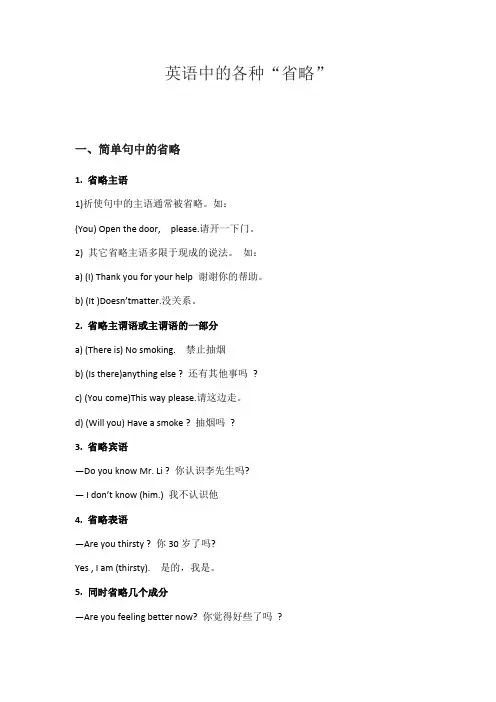
英语中的各种“省略”一、简单句中的省略1. 省略主语1)祈使句中的主语通常被省略。
如:(You) Open the door,please.请开一下门。
2) 其它省略主语多限于现成的说法。
如:a) (I) Thank you for your help 谢谢你的帮助。
b) (It )Doesn’tmatter.没关系。
2. 省略主谓语或主谓语的一部分a) (There is) No smoking.禁止抽烟b) (Is there)anything else ? 还有其他事吗?c) (You come)This way please.请这边走。
d) (Will you) Have a smoke ? 抽烟吗?3. 省略宾语—Do you know Mr. Li ? 你认识李先生吗?—I don’t know (him.) 我不认识他4. 省略表语—Are you thirsty ? 你30岁了吗?Yes , I am (thirsty).是的,我是。
5. 同时省略几个成分—Are you feeling better now? 你觉得好些了吗?—(I am feeling ) Much better(now) 好多了。
(I wish) Good luck (to you) .祝你好运/祝你顺利。
二. 并列复合句中的省略在并列句中后边的分句可以省略与前边分句中相同的成分。
如:a) The boy picked up a coin in the road and (the boy ) handed it to a policeman.这个男孩在马路上拾起一枚硬币并把他交给了警察。
b) Your advice made me happy but(your advice made) Tom angry .你的建议使我高兴但使汤姆生气。
c) Tom must have been playing basketball and Mary (must have been)doing her homework.汤姆肯定一直在打篮球,玛丽一直在写作业。
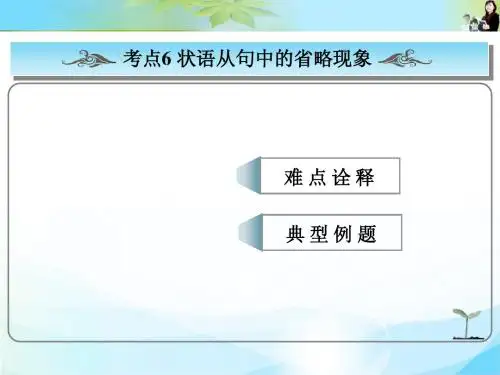
英语语法的介词省略现象 英语⾥有⼀些在⼈们的语⾔交流中约定俗成的习惯性省略,介词的省略就属于这类现象。
常见的介词省略1. 与spend, have difficulty (trouble, a hard time), waste no time, lose no time等搭配时,in + doing 结构中的介词in 可省略。
如: I spent the whole summer and fall (in) hunting for a job. 我⽤了整个夏天和秋天来找⼯作。
2. 当in ... way 中way 被限定词 the, this, that等修饰时,介词in可省略。
如: “Jim!” she cried, “don’t look at me (in) that way.” “吉姆!” 她⾼声叫道,“不要那样看着我。
”3. 与动词choose, elect, name, consider及think of 等连⽤时,as引导的介词短语作补语,此时的介词as可以省略。
如: We always consider him (as) a respectable senior. 我们总是把他看作是令⼈尊敬的长者。
4. 在 prevent ... from + doing 和 stop ... from + doing的结构中,from可以省略。
如: In many countries, laws have been passed to prevent people (from) killing wild animals. 在很多国家,已经制定了法律来防⽌⼈们捕杀野⽣动物。
5. 与某些名词词组连⽤作时间状语时,for通常可省略。
如: The drought in Chongqing this year lasted (for) two months until the new term began. 重庆今年的⼲旱持续了两个⽉,直到新学期开始(才结束)。
语法中的省略现象语法中的省略现象是指在句子中省略某些成分,但在意义上仍能完整传达信息的一种现象。
省略在汉语和英语中都存在,但具体的情况、规则和用法会有所不同。
本文将分析汉语和英语中常见的省略现象,并探讨其语法性质及应用。
一、汉语中的省略现象1. 主语省略在特定语境下,当主语已经明确或者可以通过上下文推断时,可以省略主语。
例如:(1) 昨天去了电影院。
这句话中省略了主语“我”,但仍然能够理解说话者是指自己。
在日常交流中,主语省略是很常见的现象。
2. 谓语省略当句子中的动词已经通过副词、形容词等其他成分表达了,可以省略谓语动词。
例如:(2) 你喝咖啡,我喝茶。
这里省略了第二个句子的谓语动词“喝”,但仍然能够理解“我喝茶”的意思。
3. 宾语省略当宾语已经通过上下文或者句子中的其他成分明确指出时,可以省略宾语。
例如:(3) 小明擅长弹吉他,小红擅长弹钢琴。
这里省略了第二个句子中的宾语“钢琴”,但读者能够根据上下文理解。
4. 状语省略一些状语在特定语境下也可以省略。
例如:(4) 我明天打篮球,你后天打。
这里省略了第二个句子中的状语“篮球”,但仍然能够理解说话者的意图。
二、英语中的省略现象1. 主语省略与汉语类似,当主语已经明确或者可以通过上下文推断时,可以省略主语。
例如:(5) Are you coming to the party? Yes, I am.这里省略了第二句的主语“I”,但读者能够根据上下文理解。
2. 谓语省略在英语中,当句子中已经有了助动词或情态动词时,可以省略实义动词。
例如:(6) I can swim, but she can't.这里省略了第二个句子中的实义动词“swim”,但读者能够理解其意思。
3. 宾语省略在英语中,有时可以省略宾语,前提是宾语在上下文中已经明确。
例如:(7) I like jazz music, and she classical.这里省略了第二个句子中的宾语“classical music”,但读者能够根据上下文推断。
英语中IF引导虚拟条件句中的省略现象
在引导虚拟条件句的时候,if在什么情况下会省略呢,一些学生还是存有疑惑,今天我给大家简单说明一下。
(这可是高考语法中考核的一项核心内容,大家必须掌握的)
如果从句中有were, had, should,可以省略if,用倒装句式“were, had, should+主语”。
如:
If I were at school again, I would study better.
= Were I at school again, I would study better.
If you had come earlier, you would catch the bus.
= Had you come earlier, you would catch the bus.
If it should rain tomorrow, we would not go climbing.
=Should it rain tomorrow, we would not go climbing.
注:若省略的条件句中的谓语动词是否定形式时,不能用动词的缩略形式。
如:
我们可以说:Were it not the expense, I would go abroad now. 但不能说:Weren't it for the expense, I would go abroad now.。
英语中的种种省略现象(二) 如:① No smoking .禁止抽烟 ② anything else ? 还有其它事吗 ? ③ This way please.请这边走。 ④ Have a smoke ? 抽烟吗 ? 1.不定式作某些动词的宾语时,这些动词常见的有:love,like,care,wish,hope,expect,prefer,refuse,mean,try,oblige,advise,persuade,agree,want,afford,forget,remember,try,manage等。如:— You should have thanked her before you left . —I meant to,but when I was leaving I couldn’t find her anywhere .你本该在离开前谢谢她,我本打算这么做,但当我就要离开的时候我却找不到她了。 You can do it this way if you like to .如果你想做,你可以这么做。 2.不定式作某些动词的宾语补足语或主语补足语时,这些动词常见的有:ask,tell,advise,force,persuade,wish,allow,permit,forbid,expect,order,warn 等。如 : The boy wanted to ride his bicycle in the street,but his mother told him not to . She wants to come but her parents won’t allow her to 3.不定式在句中作某些形容词的状语时,常见的形容词有 :happy,glad,eager,anxious,willing,ready 等。如: — I will be away on a business trip .Could you mind looking after my cat ? — Not at all .I would be happy to 4.不定式作某些复合谓语时,常见结构如:be able to,be going to,have to,ought to,used to等。如: He doesn’t like fish but he used to 他现在不喜欢吃鱼,但过去喜欢。 1.主语部分有to do,系动词 is 或 was 时,作表语的不定式通常省去to.如: The only thing you have to do is press the button.你必须做的唯一事情是按按钮。 2.作介词but,expect,besides 的宾语,前面又有实意动词 do时,不定式通常省去to. 如:He said that Chen Shuibian had nothing to do except push a pro-“independence” timetable.他说陈水扁除了推进支持“独立”的时间表外,什么也没有做。 3.主语部分暗含to do,表语中的不定式通常省去to.如:All I want is go to school and study hard .我想要的就是上学,努力学习。 4.当两个或多个不定式并列时,其后的不定式符号可以省略,但有对比关系时不可省略。如:It is easier to say than to do . 5.在would rather…than… 等结构中,不定式符号常常要省略。 如:I would rather stay at home than go to see a film.我宁愿呆在家也不愿去看电影。 6.在see,watch,notice,hear,listen to,look at,feel,have,make,let,observe 等词后作宾语补足语时省略不定式符号to; why do 结构 中,不定式不带to. I saw her enter the room . 我看见她进入了房间。 Why not join us ?为什么不加入到我们的行列里来呢? 1.名词所有格修饰的名词,若表示住宅、店铺、教堂或上下文已暗示或明确指出过的事物时,常常可以省略。如:We spent the weekend at the Mary’s.我们在玛丽家过的周末。 2.What和 how引导的感叹句中,常可省略主语 it 和be动词 如: What a wonderful victory for Tom ! How beautiful to be treated like a normal child . 中学英语教学资源网 [1][2]
高中英语知识点归纳非谓语动词的省略高中英语知识点归纳:非谓语动词的省略非谓语动词是英语语法中的重要部分,它可以在句子中充当名词、形容词或副词。
非谓语动词的省略现象广泛存在于英语语境中,掌握这一知识点对于理解和运用英语语法有着重要的作用。
本文将对高中英语中非谓语动词的省略现象进行归纳和总结。
一、不定式的省略不定式是非谓语动词的一种形式,通常由“to + 动词原形”构成。
在以下情况中,不定式可以被省略:1. 当不定式的逻辑主语与句子的主语一致时,可以将不定式省略。
例:Jack plans to go swimming this afternoon, and I plan to (go swimming) too.2. 当句子主语与不定式所表达的动作的执行者一致时,可省略不定式的主动式。
例:He asked me to help, but I refused to (help).3. 当两个不定式所表示的动作相同,并且前一个不定式中含有动词“let”时,可以省略后一个不定式。
例:He let us stay at his house, or just go.4. 当句子主语与不定式所表达的动作的承受者一致时,可省略不定式的被动式。
例:He made me (be) his assistant, which was a great honor.二、动名词的省略动名词是以动词的-ing形式构成的名词,在某些情况下可以省略。
以下是一些常见的动名词省略的情况:1. 当动名词作主语时,可以省略动名词。
例:Smoking is harmful to health.→(To) smoke is harmful to health.2. 当动名词作宾语时,可以省略动名词。
例:I enjoy s wimming in summer. →I enjoy (swimming) in summer.3. 当动名词作表语时,可以省略动名词。
高考英语考点-省略句省略句是高考考查的语法重点,又是学习的难点。
在英语中,为了使句子简洁明快,突出重点,常用"省略句",只要不影响句意的表达,能省略的成分尽可能省略。
省略现象随处可见,大致可分为以下几种情况。
一、句子成分的省略1. 省略主语。
如:Haven't seen you for ages!好久不见了!2.省略谓语。
如:(Is there) Anything you want? 你要什么东西吗?(Does) Anybody need help? 有人要帮忙吗?3. 省略宾语。
如:I don't know (where he is ). 我不知道。
4.省略主语和谓语(或谓语的一部分),只剩下表语、宾语、状语或其它成分。
如:(I'm) Afraid I can't come. 恐怕我不能来了。
(Have you) Got any ink? 你有墨水吗?【高考链接】-It’s a long time since I saw my sister.(2007全国卷1)-_________her this weekend?A. W hy not visitB. Why not to visitC. Why not visitingD. Why don’t visit解析:答案为A。
本题考察省略结构,这里why not visit =Why didn’t you visit ,这种既注重基础又兼顾生活交际的试题,其实多数学生感觉很容易能得出正确的A答案。
二、复合句的省略1.在含有状语从句的复合句中由when,while,as, once,whenever引导的时间状语从句;或由if,unless引导的条件状语从句;由though,although,even if ,even though引导的让步状语从句;由as though,as if,as引导的方式状语从句;由because引导的原因状语从句;由wherever引导的地点状语从句,若从句的主句是it或与主句的主语相同,且在谓语中含有be时,常省略从句的主语和be。
高中英语语法之省略 英语中省略现象较为普遍,对省略的考查已成为高考中的热点。句子成分的省略,可分为以下几种情况:
为了使话说得简明扼要,英语句子中某个单词、短语甚至从句或主句都可以省去。
Ⅰ、状语从句中的省略用法 一、 如果从句的主语和主句的主语一致,且从句的谓语含有be动词的某种形式(am/is/are/was/were),可同时省略从句的主语和be动词的某种形式。 1、 when,while引导的时间状语从句 e.g. Do be careful when (you are) crossing the street. When/While (I was) on my way to work, I met her. 2、 if,unless,once引导的条件状语从句 e.g. If (it is) properly treated, waste will do no harm to the environment. I’ll not go to the party unless (I am) invited. Once (you are) caught stealing in a supermarket, you will be punished. 3、 though,although,whether,no matter whether/what/how/who等引导的让步状语从句 e.g. He was happy, though/although (he was) poor. Whether (she is) sick or well, she is always cheerful. No matter how/However hard the task (is), we must fulfill it in time.(注:从句的主语和主句的主语不一致时,只省略从句中的be动词形式) 4、 as if,as though引导的方式状语从句 e.g. He rubbed his eyes and yawned as if/though (he was) waking up after a long sleep. He stood up as if/though (he wanted) to leave.(as if/though + to do表示一个将来的动作) 二、 than,as引导的比较状语从句中的省略用法:当不同的主语进行比较时,一般省略从句中的谓语;当从句中的主语与谓语(be动词除外)和主句中的主语与谓语相同时,通常省略从句中的主语和谓语,只保留比较部分。 e.g. He is taller than his brother (is). I have as much as confidence in you as (I have confidence) in him. 三、 以if从句为代表的状语从句中的特殊省略用法:通常省略了it is,that is,there is/are。 e.g. If (it is) possible/necessary, this old temple will be rebuilt. If (that is) so, I will call you back at 5:00 pm. There are only a few books in our school library, if (there are) any. Ⅱ、定语从句中的省略用法 关系词的省略:关系代词that,which,whom等在限制性定语从句中充当宾语且不位于介词之后时,可以省略;in which或that在先行词way后作方式状语从句时可省略。 e.g. The man (that/who/whom) you visited last night is my grandpa. I don’t like the way (in which/that) you treat the girl. Ⅲ、虚拟语气中if及should的省略 1、 当条件状语从句中有were,had,should等时省略if,把它们提至句首,形成倒装句。 e.g. If I were a teacher, I would be strict with my students. = Were I a teacher, I would be strict with my students. 2、 Suggest,insist,order,require等表示建议、要求、命令的动词后接的从句中,谓语动词常用“should+动词原形”,should可以省略。 e.g. The doctor suggested that he (should) try to lose weight. Ⅳ、不定式符号to的省略 1、 感官动词see,hear,feel,watch等和使役动词have,make,let等后接不定式作宾语时,不定式省略to。(一感feel,二听hear, listen to, 三让have, let, make,四看see, look at, observe, watch) 2、 do nothing but,can’t help but等结构常接省略to的不定式。 E.g. We didn’t do anything but stay at home watching TV yesterday. Hearing the news, she couldn’t help but cry. 3、 在特定语境中为了避免重复,当不定式再次出现时,在want,wish,hope, try,plan,like,love,hate后往往只保留to,而省略后面的动词。但不定式后有be,have时,也保留be和have。 E.g. My parents encouraged me to go to college, but I didn’t want to. Ⅴ、So和not的替代性省略 用于避免重复前面所说过的内容,替代词so/not替代肯定或否定的名词性从句。可与believe,do,expect,fear,guess,hope,say,speak,suppose,think,I’m afraid等连用 e.g. – Do you suppose he is going to attend the meeting? – I suppose not. Ⅵ、日常交际中的省略 在情景会话中,答语常常省略不会引起歧义的主语、谓语或宾语部分,而只保留对方希望了解的内容。在复合句或并列句中,也有省略主、谓、宾的情况。 e.g. – How many copies do you want? -- (I want) Three copies, please. -- Have you ever been to the Great Wall? -- No, (I have) never (been to the Great Wall). 省略句练习 1. When first ________ to the market, these products enjoyed great success. (NMET 2004全国卷II) A. introducing B. introduced C. introduce D. being introduced 2. It shames me to say it, but I told a lie when ________ at the meeting by my boss. (NMET 2004全国卷IV) A. questioning B. having questioned C. questioned D. to be questioned 3. The man we followed suddenly stopped and looked as if ________ whether he was going in the right direction. (NMET 2003 安徽春) A. seeing B. having seen C. to have seen D. to see 4. Generally speaking, ________ according to the directions, the drug has no side effect. (NMET2003上海卷) A. when taking B. when taken C. when to take D. when to be taken 5. Unless ________ to speak, you should remain silent at the conference. (NMET 2003上海春) A. invited B. inviting C. being invited D. having invited 6. When ________ , the museum will be open to the public next year. (NMET 2002上海春) A. completed B. completing C. being completed D. to be completed 7. Though ________ money, his parents man-aged to send him to university. (NMET 2002上海卷) A. lacked B. lacking of C. lacking D. lacked in 8. The research is so designed that once ________ nothing can be done to change it. (NMET 2002) A. begins B. having begun C. beginning D. begun 9. —You 're always working. Come on, let's go shopping. — ________ you ever want to do is going shopping. (NMET 2002北京、安徽、内蒙古春) A. Anything B. Something C. All D. That 10. Is this the reason ________ at the meeting for his carelessness in his work?(NMET 2002上海春) A. he explained B. what he explained C. how he explained D. why he explained 11. What surprised me was not what he said but ________ he said it. (NMET 2004湖北卷) A. the way B. in the way that C. in the way D. the way which 12. It is easy to do the repair. ________ you need is a hammer and some nails. (NMET 2004天津卷) A. Something B. All C. Both D. Everything 13. That's an unpleasant thing to say about your father after ________ he's done for you. (NMET 2004全国卷) A. something B. anything C. all D. that 14. As you've never been there before, I'll have someone ________ you the way. (MET 1990上海卷) A. to show B. show C. showing D. showed 15. —I'll be away on a business trip. Would you mind looking after my cat? —Not at all, ________ . (NMET 1995) A. I have no time B. I'd rather not C. I'd like it D. I'd be happy to